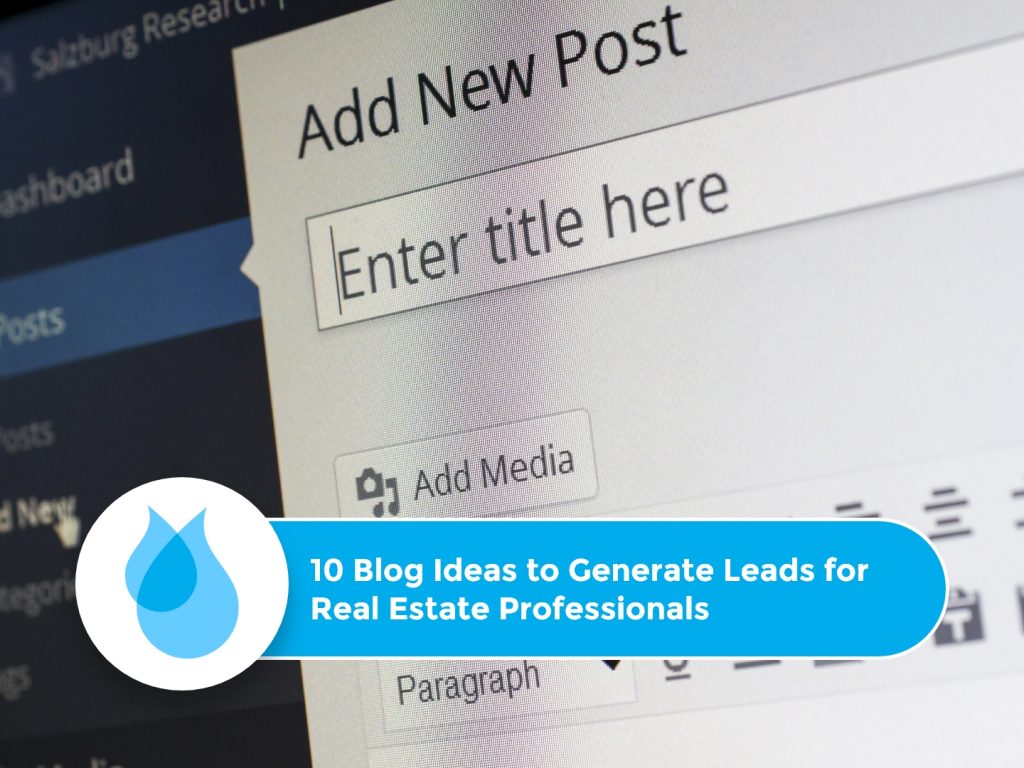
Blogging offers a range of advantages, including positioning you as an expert in your field and highlighting select pearls of your unique wisdom, whether you are targeting other real estate industry professionals or clients and prospects.
But when it comes down to it, real estate is an area that has generated a mind-boggling amount of content. So, what can you blog about that people will actually be interested in reading?
Here are 10 blog ideas broken down into five key categories that are designed to help real estate professionals achieve genuine traction.
WRITE ABOUT YOUR CURRENT LISTINGS
- New listings that suit multiple customer segments – Obviously the first thing most people will think of is to write about the “dream home” they have on their books. But it is far more effective to write about new listings you win that are within reach for the majority of your prospective buyers.
- Properties that have come down in price – Hearing about any pricing adjustments could be the factor that turns a prospect into a client. It can also pique consumer interest and get them looking for bargains that may have come up since they last viewed your listings.
WRITE ABOUT YOUR TARGET AUDIENCES (BUYERS, VENDORS, RENTERS, INVESTORS)
- Buyers and investors – An article that addresses typical questions you encounter from people interested in purchasing a property will help cut down on time spent responding to the same inquiries. Also, highlight if there are any neighbourhoods that are having infrastructure upgrades or local additions like parks.
- Write for various specific audiences – Speak directly to customer segments like first home buyers, growing families, urban professionals, retirees, etc. Just make sure you don’t overdo it by repeatedly writing for just one specific audience.
WRITE ABOUT YOUR LOCAL MARKET
- Local market trends – If they are considering a particular suburb or region, people will always be interested in whether homes sales figures are up or down, what auction closing rates are like, if it’s a buyer’s or seller’s market, what properties represent best value for money, etc.
- Profile local lifestyle features – This helps you sell people on a specific area where you might have a greater number of listings, plus mentioning specific enterprises, like shops, restaurants, cafes, entertainment and nightlife for example, will win you points with local business owners.
TELL CLIENTS AND PROSPECTS ABOUT YOURSELF
- How you approach marketing – By explaining your marketing mix and how it contributes to a sales pipeline, potential vendors and buyers will gain a sense of comfort that comes with clarity and transparency. Plus spilling the beans on any unique marketing initiatives you leverage will differentiate you from other agents.
- Conduct client interviews – You need only look at the impact of Yelp and Google Reviews to realise that consumers trust reviews. Having past clients tell their story and highlight how you helped make the process easier assists in building a reputation of reliability and trustworthiness.
EXPLAIN RELEVANT REAL ESTATE SUBJECTS
- Glossary of terms – By helping your audience understand commonly used phrases within the industry that they may not have been exposed to, you are providing a valuable educational service. Plus, in providing that service where other agents haven’t, you’re also reinforcing the notion that you are transparent and an honest operator.
- Mortgages, lending criteria, insurance, stamp duty, conveyancing – You don’t want people leaving your website for information when you can provide it for them as a value-added service. Creating a blog with links to your own library of resources on the many contractual and transactional considerations of property deals will help keep people engaged with your website, lowering bounce rates and securing mindshare as a go-to for all things real estate.
